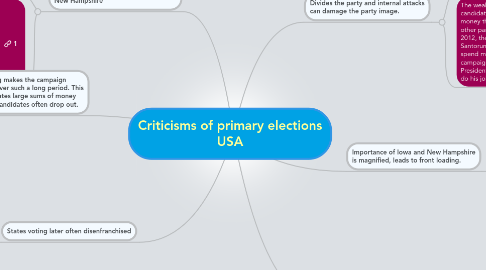Criticisms of primary elections USA
by Charlie Barker

1. Disproportionate influence for Iowa and New Hampshire
1.1. This point is perhaps the most significant. Both Iowa and NH predominantly white and Christian states. Yet the influence they have is huge. It is widely known that winning in Iowa gives huge momentum going into the following primaries. If you don't finish top 4 in Iowa, you are effectively discounted as a candidate. This was seen in 2012 when Rick Perry dropped out following his 5th place finish.
1.2. Furthermore, it can launch unintended candidates to the fore, in 2008 Hilary Clinton was the widely preferred candidate, but a groundbreaking Iowa victory for Barack Obama changed everything. In 2012, Rick Santorum was polling 2% up until Iowa. His personal visit to every single caucus county in Iowa gave him an unexpected Iowa draw with Romney, making him the only viable challenger in the rest of the campaign.
2. Front loading makes the campaign stretch out over such a long period. This costs candidates large sums of money and poorer candidates often drop out.
2.1. In 2012, Mitt Romney and Rick Perry emerged as leading candidates as early as June 2011 due to their fund raising ability and personal wealth. Romney held the lead in the polls from day 1 as many other popular candidates like Ron Paul and Jon Huntsman were not seen as serious candidates due to not self financing at the same level.
3. Open primaries can result in raiding.
3.1. Following the Iowa caucus in 2012 and the surprise win for Santorum, Democrats in states like Michigan with open primaries actively went and voted for Rick Santorum, seeing him as a weak candidate.
4. States voting later often disenfranchised
4.1. In 2008, John McCain secured the Republican nomination on Super Tuesday when 24 states voted in February. There were multiple states left to vote but because McCain had already wrapped up the nomination, those states were not allowed to vote.
5. Importance of Iowa and New Hampshire is magnified, leads to front loading.
5.1. Results in states madly jamming primaries to the front of the calendar to ensure that they get a voice.
5.2. Eg. In 2008, 24 states held their primary on Super Tuesday in February 2008. By comparison only 10 did this in 2012 in March.
6. As a result, the period before Iowa becomes even more important, the invisible primary.
6.1. By the time the candidates got to Iowa, the scrutiny had been so intense that the only undamaged candidate was the one who was so irrelevant that he had avoided scrutiny; Rick Santorum.
6.2. The 2012 invisible primary was a bloodbath. The GOP ran a series of televised debates in 2011 before the Iowa caucus allowing the candidates to knock chunks out of each other. These debates drew a blunder from Rick Perry and he never recovered. After Iowa, he dropped out. The media dug up a sexual harassment scandal against Herman Cain, making him drop out, and Michele Bachman was similarly caught out by media scrutiny. This claims many candidates before Iowa even happens.
7. Divides the party and internal attacks can damage the party image.
7.1. In 2008 the battle between Clinton and Obama raged on all spring and into summer, while McCain had wrapped up the nomination early. The damage done with mutual attacks led to speculation that McCain would be facing a weakened Democrat for the White House.
7.2. The weakening effect is not just image, candidates were forced to spend campaign money that could have been spent again the other party just to secure the nomination. In 2012, the ongoing string of victories for Rick Santorum after Iowa forced Romney to spend money he would rather have spent campaigning against Obama, while the President could sit back and let Santorum do his job for him.


